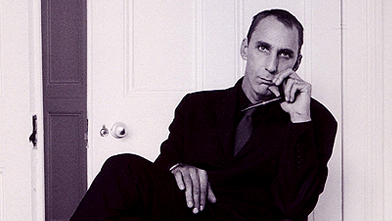(This is the second part of a two-part interview with Tom McCarthy. To listen to Part One, go here.)
Condition of Mr. Segundo: Baffled by French artistic references.
Author: Tom McCarthy
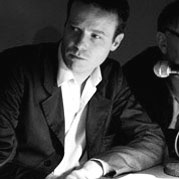 Subjects Discussed: Guns and weapons, the smell of cordite, authenticity, Remainder‘s protagonist as revolutionary, the ethical imperative of bearing witness, Antonioni’s films, Andy Warhol, Lockean nouns, the central axis of art, philosophy, and literature, Stanley Milgram’s experiments, Jeremy Deller’s reenactment, The Cramps, prisoner reenactments of the “Thriller” video, the common motif of the Michelin Man within Remainder and William Gibson’s Pattern Recognition, Tristram Shandy, the bid to be authentic, author intuition and ambiguity, reenacting a bank heist, Bob le Flambeur, Pierre Huyghe’s The Third Memory, Dog Day Afternoon, bubbles, wine and dinner, the Blueprint Cafe, visualizing a carrot, Samuel Beckett, Giambattista Vico’s idea of history running in loops and its influence upon Finnegans Wake, the lineage of repetition, Shakespeare and plagiarism, mainstream publishing remaining in denial about modernism, hooking up with Clementine Deliss and Thomas Boutoux, Olympia Press, Deliss’s distinction between art and mainstream publishing, middlebrow novels, and inventing meaning from simple form.
Subjects Discussed: Guns and weapons, the smell of cordite, authenticity, Remainder‘s protagonist as revolutionary, the ethical imperative of bearing witness, Antonioni’s films, Andy Warhol, Lockean nouns, the central axis of art, philosophy, and literature, Stanley Milgram’s experiments, Jeremy Deller’s reenactment, The Cramps, prisoner reenactments of the “Thriller” video, the common motif of the Michelin Man within Remainder and William Gibson’s Pattern Recognition, Tristram Shandy, the bid to be authentic, author intuition and ambiguity, reenacting a bank heist, Bob le Flambeur, Pierre Huyghe’s The Third Memory, Dog Day Afternoon, bubbles, wine and dinner, the Blueprint Cafe, visualizing a carrot, Samuel Beckett, Giambattista Vico’s idea of history running in loops and its influence upon Finnegans Wake, the lineage of repetition, Shakespeare and plagiarism, mainstream publishing remaining in denial about modernism, hooking up with Clementine Deliss and Thomas Boutoux, Olympia Press, Deliss’s distinction between art and mainstream publishing, middlebrow novels, and inventing meaning from simple form.
EXCERPT FROM SHOW:
McCarthy: I mean, lots of critics have seen Remainder as a sort of postmodern parable. Or a parable of the postmodern. That history’s ended and we’re just a chain of repetitions. And it’s all to do with digital culture. And so on. And so on. But if you look in literary history, you get exactly the same logic played out in Don Quixote, for example, where Don Quixote reenacts — literally reenacts! — stylized moments from penny novels that he’s read in a bid to be more authentic. In Tristram Shandy by Lawrence Sterne, Uncle Toby has lost one of his testicles in the Battle of Namur. And so he spends his whole retirement gardening. And he lays out the flowers in his garden in the exact position of the soldiers of the battles — so the red flowers are like the British and the blue flowers are the French, or whatever it was. You know, even Hamlet sits around doing nothing for half the play and then hires these actors to literally — to reenact his father’s death scene in front of the whole court. There’s this kind of awkward moment. So I think you find these patterns played out, right back to the beginnings of literature almost. I mean, I suppose the most contemporary or modern version of it, and one that was very much on my mind when I wrote the book, was Ballard’s Crash, which is a fantastic book, and its hero again reenacts car crashes, reenacts stylized violent moments, in a bid to be authentic. Ballard makes it very, very clear. He says the only real thing in this world is the car crash. And therefore we must reenact it and create the perfect one.
Listen: Play in new window | Download
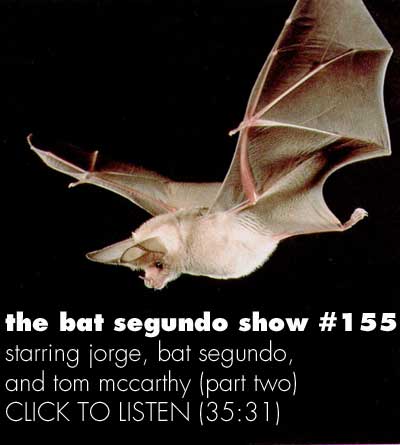
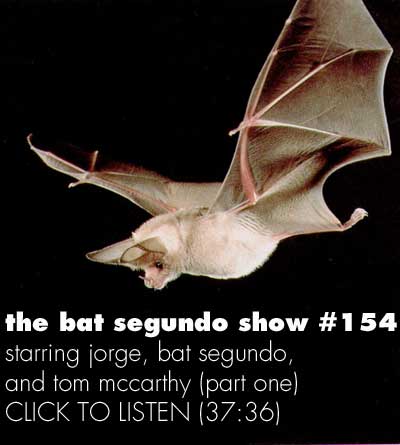
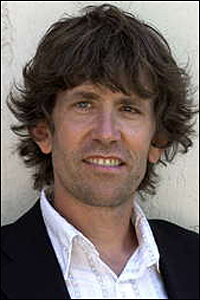 Walter: We were clinging to our economy, and the fact that our leaders — Giuliani and Bush at the time — said they attacked our economy. They attacked our way of life. And the fact that we didn’t bat an eye over the fact that they equated our economy with America, with our way of life, it was as if we had forgotten that there was some larger thing. And then, as we started debating whether or not it was okay to torture, and this lurched into a war that I didn’t agree with, it just seemed as if the conflation of victim and hero, the confusion of economy and country, were disastrous. And so, it comes out in a novel.
Walter: We were clinging to our economy, and the fact that our leaders — Giuliani and Bush at the time — said they attacked our economy. They attacked our way of life. And the fact that we didn’t bat an eye over the fact that they equated our economy with America, with our way of life, it was as if we had forgotten that there was some larger thing. And then, as we started debating whether or not it was okay to torture, and this lurched into a war that I didn’t agree with, it just seemed as if the conflation of victim and hero, the confusion of economy and country, were disastrous. And so, it comes out in a novel.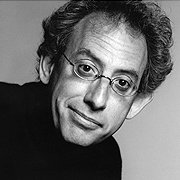 Kalfus: You know, you want these words to go off in the reader’s head in a certain way. You really do. I mean, that’s what you’re trying to do when you write. And sometimes, you do that with commas. Or you do that with sentences. You do it with colons. Semicolons. Whatever it takes, you do.
Kalfus: You know, you want these words to go off in the reader’s head in a certain way. You really do. I mean, that’s what you’re trying to do when you write. And sometimes, you do that with commas. Or you do that with sentences. You do it with colons. Semicolons. Whatever it takes, you do. 